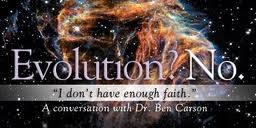For its commencement speaker this year, Emory University has chosen John Hopkins neurosurgeon and humanitarian Ben Carson. Carson’s personal story and scientific accomplishments are extraordinary (as his CV attests), which presumably led Emory seniors to put him on their list and administrators to choose him. Because Carson is famous and has already given 73 other commencement addresses, it was probably a no-brainer decision.
But it has stoked some controversy which centers on the fact that Carson is a young earth creationist who publicly dismisses evolution. Oops. The vetting committee apparently missed this, or if it was noticed, they figured it wasn’t a big deal. Except that it has become one.
Last week, nearly 500 Emory faculty members, post-docs, graduate students and others signed a public letter titled Ben Carson’s Outright Rejection of Evolution is Against Emory’s Ideals. When I first came across the story at Inside Higher Ed, it sounded like Carson was an evolutionary theist, which hardly seems objectionable:
Carson believes in natural selection, but not in the traditional evolutionary sense. “They say that natural selection is proof that things can change,” Carson said. “I say natural selection is proof that we have an intelligent creator who gave his creatures the ability to adapt to their environment.”
But after doing some digging it became clear that Carson is a young earth creationist and Seventh Day Adventist. The two go hand in hand. This artfully drafted profile of Carson by the Institute of Creation Research reveals the nature of Emory’s problem:
Benjamin S. Carson, M.D., one of the world’s foremost pediatric neurosurgeons, is professor and chief of pediatric neurosurgery at Johns Hopkins University Medical School. Born on September 18, 1951, in Detroit to a single mother in a working class neighborhood, Ben showed promise from a young age. A graduate of Yale and the University of Michigan Medical School, he was rated by a Time issue titled “America’s Best” as a “super surgeon.” Dr. Carson was also selected by CNN and Time as one of the nation’s top 20 physicians and scientists, and by the Library of Congress as one of 89 “living-legends.”
Dr. Carson is a leading research scientist. A “voracious reader of the medical and scientific literature” from his graduate school days, he has long been very interested in scientific research and has been very active in this area for his entire career, with over 120 major scientific publications in peer reviewed journals, 38 books and book chapters, and grant awards of almost a million dollars. His achievements have so far earned him 51 honorary doctorates, including from Yale and Columbia Universities.
As if this weren’t impressive enough, the article next details Carson’s world-renowned surgical skill and medical accomplishments. The picture is undeniably impressive and designed to overwhelm the reader with an aura of authority. At this point, the creationist bomb is dropped:
After Dr. Carson reviewed in detail the evidence for design in nature, he concluded, “I just don’t have enough faith to believe” that the living world happened by evolutionary processes. He added that 150 years after Darwin, there is still no evidence for evolution:
It’s just not there. But when you bring that up to the proponents of Darwinism, the best explanation they can come up with is “Well…uh…it’s lost!”…I find it requires too much faith for me to believe that explanation given all the fossils we have found without any fossilized evidence of the direct, step-by-step evolutionary progression from simple to complex organisms or from one species to another species. Shrugging and saying, “Well, it was mysteriously lost, and we’ll probably never find it,” doesn’t seem like a particularly satisfying, objective, or scientific response.
Carson concluded that the “plausibility of evolution is further strained by Darwin’s assertion that within fifty to one hundred years of his time, scientists would become geologically sophisticated enough to find the fossil remains of the entire evolutionary tree in an unequivocal step-by-step progression of life from amoeba to man.”
As a neurosurgeon, he stresses the “factors that contribute to the failure to utilize fully the most amazing God-given resource, our brain, such as peer pressure and political correctness, which often limits our willingness, even as objective scientists, to have thoughtful, rational discussions about evolution versus creationism.” It is even harder for him to accept how so many people who can’t explain how evolution can account for all life claim that it is a fact, while at the same time “insisting anyone who wants to consider or discuss creationism as a possibility cannot be a real scientist.”
The article then recounts a testy exchange between Carson and Lucy discoverer Don Johanson at a high profile meeting. Needless to say, Johanson comes off bad in the comparison.
I usually don’t have much to say about creationism because it tends to be futile. Those deeply committed to it, for some combination of psychological, social, and religious reasons, are relatively impervious to facts and persuasion. I will say, however, that Carson’s fame provides him an impressive pulpit. He’s like the Army of One for creationism. All it takes is one person like Carson to undo the work of many thousands of scientists and teachers. Those who might be open minded about evolution often need only one authority figure to assist them with their non-decision. Carson appears to be that figure.
Carson also stands as a one man refutation of Stephen Jay Gould’s naive idea (or idealistic hope) that science and religion are non-overlapping magisteria (“NOMA”). Science writ large has a great deal to say about religion and it is obvious that religion influences scientific perception. It is vain to hope that the two can be kept apart.
Where does all this leave Emory University? Not in a good place.


